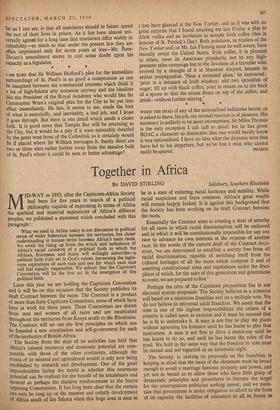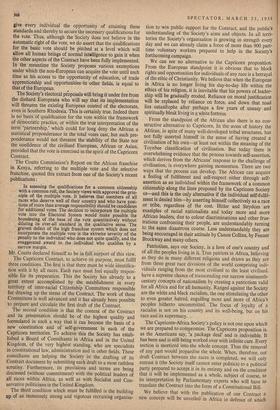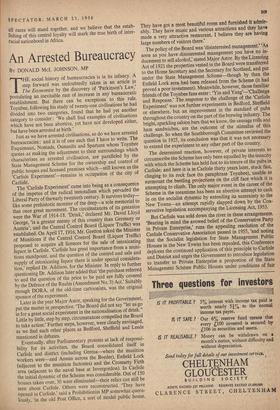Together in Africa
MID-WAY in 1953, after the Capricorn-Africa Society had been (or five years in search of a political philosophy capable of expressing in terms of Africa the spiritual and material aspirations of Africa's different Peoples, we published a statement which concluded with this paragraph :
What we need in Africa today is not discussion in political terms of wider federation between the territories, but closer understanding in human terms between Africa's main races. We await the rising up from the wrack and turbulence of Africa's racial cauldron of a political faith to which the African, European and Asian will willingly subscribe—a political faith truly set in God's values, harnessing the legiti- mate aspirations of each race and one for which each race will feel equally responsible. We submit that the Capricorn Convention will be the first act in the emergence of this political faith.
Later this year we are holding the Capricorn Convention and it will be on this occasion that the Society publishes its draft Contract between the races. The Contract is a product of more than forty Capricorn Committees, some of which have been at work for three years. These Committees are drawn from men and women of all races and are established throughout the territories from Kenya south to the Rhodesias. The Contract will set out the first principles on which can be founded a new constitution and self-government for each of the territories of British Africa.
The Society from the start of its activities has held that Africa's natural resources and economic potential are com- parable with those of the other continents, although the extent of its mineral and agricultural wealth is only now being established by research and development. One of the great imponderables facing the world is whether this enormous potential can be realised for the benefit of its inhabitants and secured as perhaps the decisive reinforcement to the forces opposing Communism. It has long been clear that the curtain can only be rung up on the massive and orderly development of Africa south of the Sahara when this huge area is seen to be in a state of enduring racial harmony and stability. While racial suspicions and fears continue, Africa's great wealth will remain largely locked. It is against this background that the Society has been working on its draft Contract between the races.
Essentially the Contract aims at creating a state of security for all races in which racial discrimination will be outlawed and in which it will be constitutionally impossible for any one race to advance its own interests at the expense of another race. In the words of the current draft of the Contract docu- ment, 'we are determined to establish a society free from all racial discrimination, capable of enriching itself from the cultural heritages of all the races which compose it and of asserting constitutional rules and regulations under the disci- plines of which, for the sake of this generation and generations to come, we are prepared to live.'
Perhaps the crux of the Capricorn proposition lies in our electoral system proposals. The Society believes in a common roll based on a minimum franchise and on a multiple vote. We do not believe in universal adult franchise. We assert that the vote is one of the highest responsibilities the citizen of a country is called upon to exercise and it must be ensured that he is fit to undertake it. A man is not free to play the piano without agonising his listeners until he has learnt to play that instrument. A man is not free to drive a motor-car until he has learnt to do so, and until he has learnt the rules of the road. We hold in the same way that the freedom to vote must be earned and not regarded as an automatic right.
The Society, in making its proposals on the franchise, is keeping in mind that the basis of the electorate must be broad enough to avoid a marriage between property and power, and yet not so broad as to allow those who have little grasp of democratic principles and procedures to become the target for the unscrupulous politician seeking power; and we main- tain that government is under obligation to afford to the limit of its capacity the facilities of education in all its forms to give every individual the opportunity of attaining these standards and thereby to secure the necessary qualifications for the vote. Thus, although the Society does not believe in the automatic right of the vote, we do assert that the qualifications for the basic vote should be pitched at a level which will allow all human beings of normal intelligence to gain it when the other aspects of the Contract have been fully implemented. In the meantime the Society proposes various exemptions under which the non-European can acquire the vote until such time as his access to the opportunity of education, of trade apprenticeship and opportunities in other fields, is equal to that of the European. The Society's electoral prfroposals will bring it under fire from the diehard Europeans who will say that its implementation will threaten the existing European control of the electorate, even in Southern Rhodesia. This is certainly true. Indeed there is no basis of qualification for the vote within the framework of democratic practice, or within the true interpretation of the term 'partnership,' which could for long deny the African a statistical preponderance in the total votes cast, but such pre- ponderance would not threaten the stability of the State nor the confidence of the civilised European, African or Asian, provided that the vote is exercised in the spirit of the. Capricorn Contract.
The Coutts Commission's Report on the African franchise in Kenya, referring to the multiple vote and the selective franchise, quoted this extract from one of the Society's recent publications : In assessing the qualifications for a common citizenship with a common roll, the Society views with approval the prin- ciple of the multiple vote. It believes that members of all races who deserve well of their country and who have posi- tions of more than average responsibility should be candidates for additional votes. The decision to incorporate the multiple vote into the Electoral System would make possible the broadening of the base of the vote quantitatively without diluting its over-all standard in the qualitative sense. The gravest defect of the high franchise system which does not ' incorporate the multiple vote is the 'extreme severity of the penalty to the individual• who does not quite qualify, and the exaggerated award to the individual who qualifies by a narrow margin.
Mr. Coutts declared himself to be in full support of this view.
The Capricorn Contract, to achieve its purpose, must fulfil three conditions. The first is that there must be wide identifica- tion with it by all races. Each race must feel equally respon- sible for its preparation. This the Society has already to a great extent accomplished by the establishment in every territory of inter-racial Citizenship Committees responsible for drawing up the terms of the Contract. The work of these Committees is well advanced and it has already been possible to prepare and circulate the first draft of the Contract.
The second condition is that the content of the Contract and its presentation should be of the highest quality and formulated in such a way that it can become the basis of a new constitution and of self-government in each of the Capricorn territories. To achieve this the Society has estab- lished a Board of Consultants in 'Africa and in the United Kingdom, of the very highest standing, who are specialists in constitutional law, administration and in other fields. These consultants are helping' the Society in 'the drafting of its Contract document by submitting each draft to a most ruthless scrutiny. Furthermore, its provisions and terms are being discussed (without commitment) with the political leaders of all races within Africa, as well as with Socialist and Con- servative politicians in the United Kingdom.
The third condition which must be fulfilled is the building up of an immensely strong and vigorous recruiting organisa- tion to win public support for the Contract, and the public's understanding of the Society's aims and objects. In all terri- tories the Society's organisation is growing in strength every day and we can already claim a force of more than 900 part- time voluntary workers prepared to help in the Society's forthcoming campaign.
We can see no alternative to the Capricorn proposition. From the European standpoint it is obvious that to block rights and opportunities for individuals of any race is a betrayal of the ethic of Christianity. We believe that when the European in Africa is no longer living his day-to-day life within the ethics of his religion, it is inevitable that his powers of leader- ship will be gradually eroded. Reliance on moral justification will be replaced by reliance on force, and down that road lies catastrophe after perhaps a few years of uneasy and spiritually bleak living in a white fortress.
From the standpoint of the African also there is no con- structive alternative to Capricorn. In the wons of history the African, in spite of many well-developed tribal structures, has not fully asserted himself in the sense of having created a civilisation of his own—at least not within the meaning of the Toynbee classification of civilisation. But today there is overwhelming evidence that the process towards self-assertion. which derives from the Africans' response to the challenge of civilisation, is everywhere gaining momentum. There are two ways that the process can develop. The African can acquire a feeling of fulfilment and self-respect either through self- assertion as an individual within the framework of a common citizenship along the lines proposed by the Capricorn Society or—and this is the only alternative if the individual self-fulfil- ment is denied him—by asserting himself collectively as a race or tribe, regardless of the cost. Hitler and Strydom are examples of racial nationalists and today more and more African leaders, due to colour discriminations and other frus- trations confronting their people, are understandably turning to the same disastrous course. Less understandably they are being encouraged in their attitude by Canon Collins, by Fenner Brockway and many others.
Patriotism, says our Society, is a love of one's country and of all the peoples living in it. True patriots in Africa, believing as they do in many different religions and drawn as they are from three great race divisions of the world comprising indi- viduals ranging from the most civilised to the least civilised. have a supreme chance of transcending our narrow nineteenth- century concepts of nationalism by creating a patriotism valid for all Africa and for all humanity. Ranged against the Society are the white and black racialists, the one stimulating the other to even greater hatred, engulfing more and more of Africa's peoples hitherto uncommitted. The focus of loyalty of a racialist is not on his country and its well-being, but on his race and its supremacy.
The Capricorn-Africa Society's policy is not one upon which we are prepared to compromise. The Capricorn proposition is, as the Americans say, 'a package deal' and is indivisible. It has been and is still being worked over with infinite care. Every section is morticed into the whole concept. Thus the removal of any part would jeopardise the whole. When, therefore, our draft Contract between the races is completed, we will only entrust it (the Society itself cannot enter politics) to a political party prepared to accept it in its entirety and on the condition that it will be implemented as a whole, subject of course, to its interpretation by Parliamentary experts who will have to translate the Contract into the form of a Constitutional Bill.
We believe that with the publication of our Contract a new concept will be unveiled in Africa in defence of which all races will stand together, and we believe that the estab- lishing of this central loyalty will mark the true birth of inter- racial nationhood in Africa.




































 Previous page
Previous page